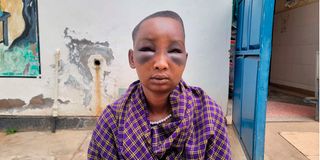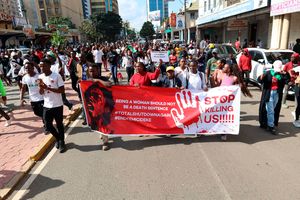
Salimo Priscilla Lolonyekie, 24, recuperating at the Samburu County Referral Hospital in Maralal town on May 19, 2025.
Salimo Priscilla Lolonyekie sits on a creaky hospital bed at the Samburu County Referral Hospital in Maralal, her face puffed with swelling, with both eyes almost shut completely.
Her head is heavily swollen, apparent evidence of the vicious blows she sustained.
The hospital ward room is quiet, save for the soft hum of machines and the occasional murmur of medical staff and nurse assistants passing by.
But inside Priscilla's mind, the memory of the evening she was assaulted by her neighbour and left to die, cannot go away.
"I do not sleep, and if I do, I can still hear him. The club is hitting my head over and over. I thought I would not wake up," Priscilla whispers, tears streaming down her bruised face.
Accusations and brutal attack
Just three nights ago, the 24-year-old mother of one was viciously attacked by her neighbour—a man she never expected to do so caused her near-fatal injuries.
A minor misunderstanding led to the incident.
The victim, who knits beaded belts and bracelets, had given her neighbour an unfinished belt to help complete. When the neighbour’s husband saw it, he mistakenly assumed his wife was knitting the belt for "a moran boyfriend."'
Enraged, the suspect first attacked his own wife before turning on Priscilla.
He accused Priscilla of facilitating his wife’s infidelity by introducing her to other men.
The suspect, who is on the run, reportedly picked up a wooden club and struck her repeatedly on the head and back and escalating into a near-fatal beating.
"He knocked on my door that evening. When I opened, he immediately flashed a torch in my eyes, and I could not see again. He hit me with a wooden club on my head, and descended on me mercilessly," Priscilla narrates.

Salimo Priscilla Lolonyekie, 24, recuperating at the Samburu County Referral Hospital in Maralal town on May 19, 2025.
'Unforgivable'
Her brother Francis Lolonyekie said they found her unconscious and barely breathing, and they rushed her to Baragoi Sub-County hospital before she was transferred to Samburu County Referral Hospital in Maralal for emergency care.
Mr Lolonyekie described the attack as barbaric and unforgivable as he asked authorities to move with speed and arrest the culprit who fled after the incident.
"We found her unconscious. It was a struggle to raise funds to pay for ambulance services from Serem village to Baragoi, and to Maralal," Mr Lolonyekie says.
"What pains most is that the culprit is still walking free while my sister is in pain. We sold our family investments to get to hospital. It is not easy," he adds.
Doctors in Samburu County Referral Hospital confirmed that Priscilla suffered blunt force trauma to the skull, which led to internal bleeding and severe psychological distress.
"I must say that she was lucky to survive. We have seen gender violence cases before, but this was among the most brutal. We have stabilised her for now," said a senior doctor in the facility.
Outrage
The brutal case of gender-based violence that resulted in the near-death of Priscilla has triggered widespread outrage and a formal petition from the activists in Seren area, Samburu County.
Salimo Priscilla Lolonyekie, 24, after she was attacked in a gender-based violence incident in Seren area, Samburu County.
The community is demanding urgent action from both county and national government authorities, following what they describe as a barbaric and deliberate act of violence fueled by a growing culture of impunity.
In a petition dated May 18 and addressed to the Governor of Samburu County, the Kenya National Commission on Human Rights (KNCHR), and key security agencies including the Directorate of Criminal Investigations (DCI) and the Inspector General of Police, the Seren community activists detailed the violent assault that led to Priscilla referred to Maralal Hospital "in a state of death."
According to the petition, the victim was subjected to targeted head trauma in what they said was a clear gender-motivated attack.
"This is not an isolated incident. Our community continues to suffer from an alarming pattern of lawlessness, including murders and violent crimes that are consistently ignored by authorities," the petition read in part.
Also Read: As femicide claims national heroes too, men's 'Safisha Rada' movement challenges culture of silence
They claim that the lack of effective law enforcement has plunged Samburu, especially Seren village, into a state of lawlessness, where even family members have turned against each other with no fear of legal consequences.
The human rights defenders called for immediate deployment of security and judicial officers to restore order and enforce justice. They further asked for urgent psychosocial and financial support for affected families, many of whom are said to be living in grief and destitution.
Samburu County police Commander Dickens Njogu confirmed the incident, saying police have already opened a manhunt for the suspect who has since fled the area. Mr Njogu termed the incident as "unfortunate " and appealed to the public to report the whereabouts of the suspect.
"Our officers are pursuing the culprit. We will arrest him. This is a very unfortunate incident," Mr Njogu said on Tuesday as he revealed that the suspect is identified as Lempiris Lemargas.
Priscilla's attack is not an isolated case of gender-based violence as the vice remains a persistent crisis in Samburu County, and is often silenced by fear, stigma, and cultural norms.
Usually, women battering is a norm among the Samburu community as majority of women face different forms of GBV that go unreported.









